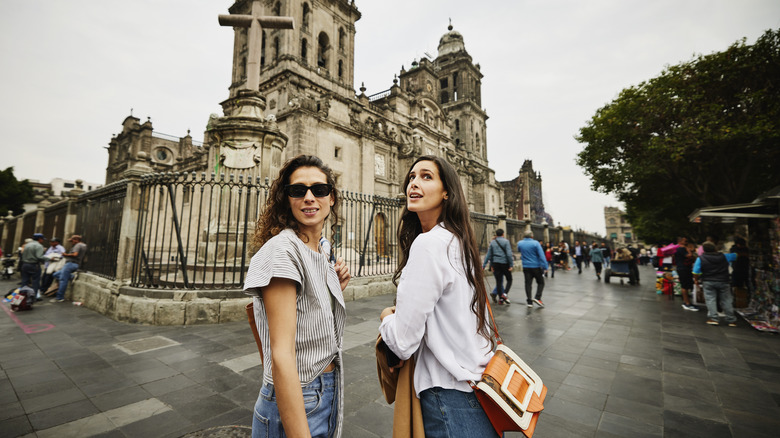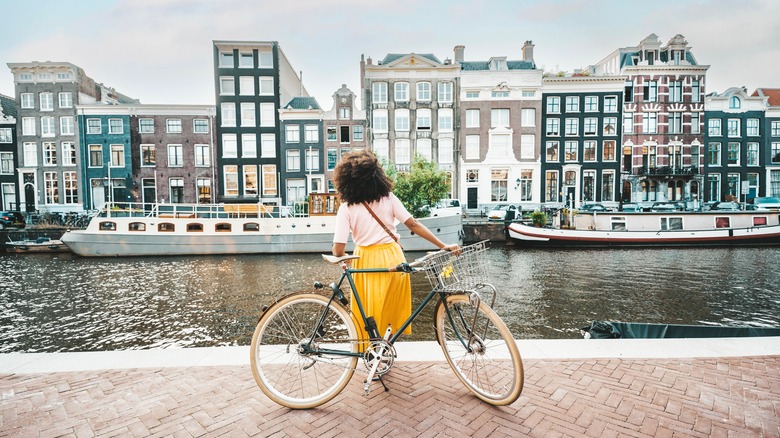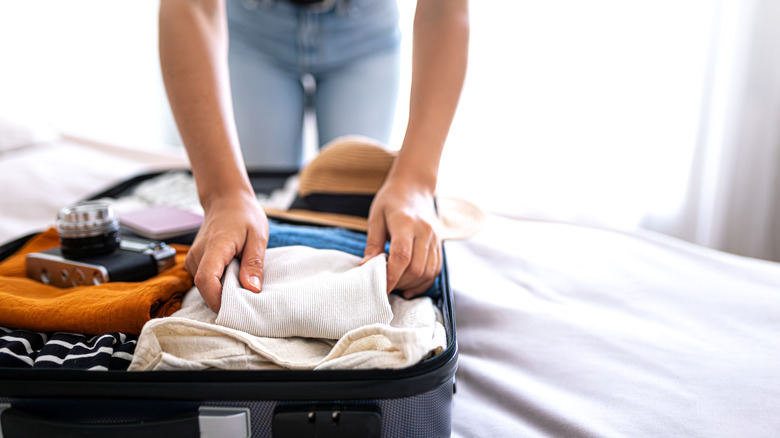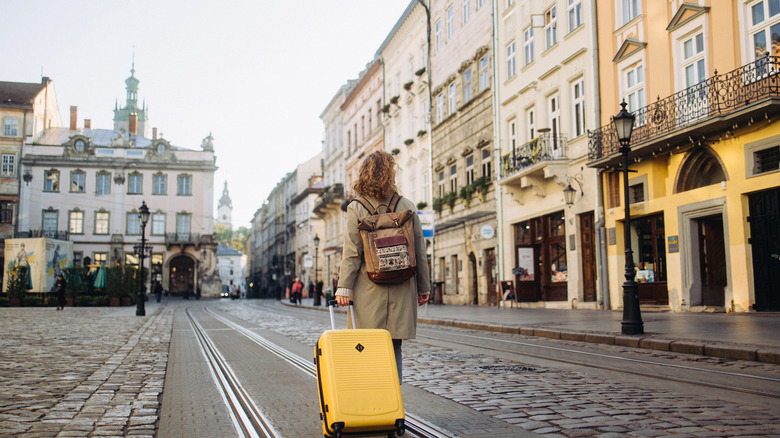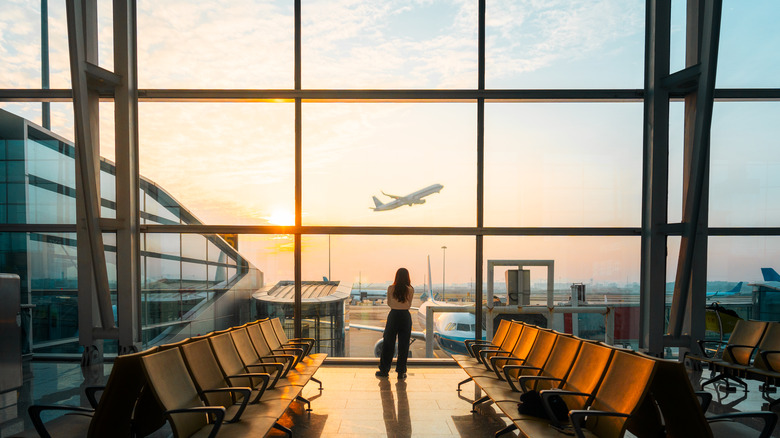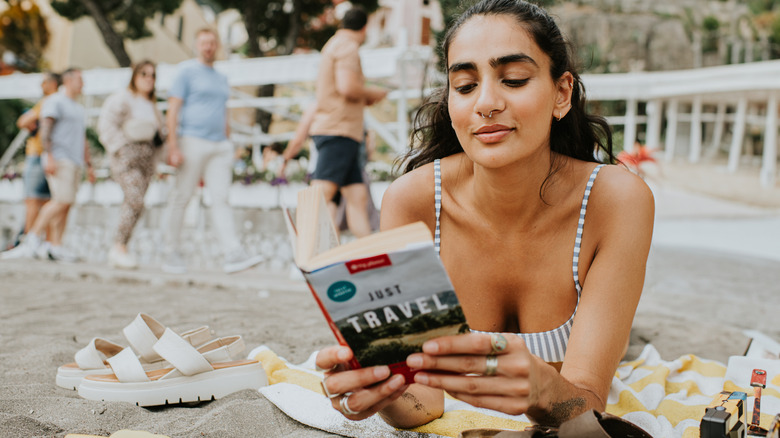The 10 Best Rick Steves Travel Tips We've Learned
Rick Steves is an accepted authority when it comes to Europe (from an American perspective), and rightly so: He's been exploring the continent, writing books about it, and leading tours from Iceland to Turkey for decades. During his years of travel, Steves as discovered a few tried-and-true travel tips guaranteed to make your trip to Europe and beyond a success.
We're not just talking about packing light and only bringing a carry-on, although we've included those, too. We've also considered advice on where to stay, how to make every penny count, how to stay safe (and keep your things safe, too), and general rules of thumb to ensure you're traveling intelligently, kindly, and responsibly. Because the last thing you want to do while you're traveling is leave the destination worse than you found it — something to think about when speaking broadly about your journey through life, as well.
Although our favorite European travel expert could philosophize all day about what makes a good traveler, let's get down to the best travel tips learned from Rick Steves that have made him a successful traveler for many years. If you follow his tips, you're practically guaranteed an incredible, memorable trip.
Stay in central hotels and avoid one-night stays, except when it comes to trains
It can be tempting to always choose the cheapest possible accommodation since that's one of the things that can eat away at your budget the quickest. However, it's worth it to choose a centrally-located hotel. Not only will this save you time and money on transportation, it'll also put you right at the center of the action. You should also aim to stay in each hotel at least two nights — with the caveat that airport hotels are good for one night. Again, it's tempting to see as much of your chosen destination as possible in your allotted time, but moving hotels and cities tends to be more expensive and more stressful.
In addition, you'll nearly always get a richer experience if you stay somewhere longer. Be kind to your mind and your budget and avoid one-night stays in hotels. "Depending on the distances involved, staying in a home base and making day trips can be more time-efficient than changing locations and hotels," Steves said on his website.
Another exception to this rule is when you're traveling by night train. In Europe, especially, trains in general are having a comeback as an economical, more environmentally-friendly way to travel, and one of the best options is a night train. Steves agrees that night trains are a game-changing hack for smart, scenic travel across Europe. Accommodation and transportation in one (usually cheaper) price, and most train stations are more centrally located than airports, saving money and time on travel costs into the city. Plus, let's be real: Night trains are just plain fun.
Know when to splurge on certain parts of your itinerary
The cheapest hotel isn't always the best, and this applies across the board. Choose the cheapest eatery, but you may get food poisoning or just have an unsatisfying meal. Similarly, the cheap but dingy hotel may have bed bugs or an uncomfortable mattress. The idea that the cheapest option is the best choice can save a quick buck, but it also comes with a price.
The most expensive option isn't always better either, so aim for middle ground. For example, you could choose a pricier restaurant than the food stand, but go for something locally-owned. In the case of accommodation, you can pay for a better location, but don't pay extra for amenities. As Steves' points out on his website: "When it comes to hotels, the irony is that the more you spend, the farther you get from the culture ... Spend enough money...and you won't even know where you are." It kind of defeats the point.
In the same vein, another of Steves' well-known travel tips is to know when to splurge. This one is highly personal, as it all depends on your needs and wants. Maybe you need air conditioning to sleep in summer (and therefore want to splurge on that hotel). Maybe you want a local guide to give you the lowdown. Or maybe you have always dreamed of a morning hot air balloon over the Sahara. Whatever "splurge" you choose, plan ahead so you know to factor it into your budget. In Steves' own words: "I'll probably always ... [wring] the most value I can from my travel dollar. But I'm learning the goal is not to save the most money. It's ... to know my options so my trip fits both my budget and my dreams."
Timing is everything, so it's best to book ahead
The timing of your visit matters. Make sure you're aware of special holidays or events that could impact crowds or shut down sites. It's also a good idea to double-check the weather. And one of the best budget secrets for traveling anywhere? Visiting during the shoulder or off-season.
Time is also money. This applies to all aspects of travel, but especially transportation. Yes, it can be pricey to book a taxi from the airport, but after a long, stressful flight, a smooth trip to your accommodation may be necessary. And taking that janky bus up the mountain to save a few bucks? Not worth your life and not worth those extra dollars, either. "I'm a huge fan of Europe's public transportation, and use it whenever I can. But time, like money, is a limited and valuable resource that needs to be spent smartly. When I'm short on time, a taxi ride that gets me quickly to my destination beats out a long, cheap bus ride," Rick Steves said on his website.
Another crucial part of the Rick Steves-approved checklist to always do before vacation is to book ahead at particularly famous attractions. As Steves notes on his website: "Crowds are unavoidable at big attractions, like the Eiffel Tower or Anne Frank's house — but what is avoidable is standing in line for hours to buy tickets." If you don't buy a ticket and book a slot at the Louvre, for example, chances are you'll end up waiting in line. That's probably not how you want to spend your trip. Don't forget, your time is valuable, especially your vacation time.
Be vigilant & be prepared
Depending on where you're going, chances are, the major tourist areas will be quite safe. However, petty theft is common, nearly worldwide, especially in cities or crowded areas. Some of Rick Steves' expert tips to not get pickpocketed include staying alert, keeping your valuables locked up (or better yet, at home), and wearing a crossbody bag or a hidden wallet. You may not need to go so far as carrying a decoy wallet, like Steves recommends, but these things can go a long way to protecting your items and yourself.
Other tips you can use are to avoid large crowds when possible, avoid people trying to sell you things on the street, avoid giving out personal information, dress like a local, and always secure your items with an extra loop around your wrist or even with a physical attachment, like a lanyard. As Steves notes on his website: "Thieves want to quickly separate you from your valuables, so even a minor obstacle can be an effective deterrent." He continues with advising travelers to "leave the fancy bling at home" as "the thief chooses the most impressive suitcase in the pile — never mine."
In addition to staying vigilant, always be prepared. Make digital scans of your important documents, have access to your cards both physically and online, consider travel insurance, choose strong passwords, activate "Find My Phone" apps, and back up said phone. You won't want to lose all those pictures and memories, either.
Document your trip
"Life moves pretty fast," as Ferris Bueller says, and this applies even more during your grand adventure. The only cure for this — besides doing your best to stay in the moment — is to document your thoughts in real time. Keep a journal and take plenty of photos, even of smaller moments. You don't need to document everything, of course, nor do you need a lengthy chronological tome (unless you want one). As Steves sums up on his website: "Collecting intimate details on the road, and then distilling them into your journal, sharpens your ability to observe and creates a keepsake you'll always cherish." Looking back on your journal from your trip will trigger surprising memories of moments you've forgotten and moments you'd rather not forget. After all, "Travel brings new color to your life, and journaling lets you stand back to understand and enjoy the art as it unfolds," as Steves puts it.
Journaling can also be ideal for helping you process your trip. In the rush of new experiences and traveling from place to place, not only will you be tired, but also be potentially overwhelmed. New languages, foods, sights, colors, and people are a lot for one brain to take. Sitting down to write gives you a moment of much-needed calm, and will also help you hash out any big feelings you'll likely be experiencing during your travels.
Don't be a travel perfectionist
No matter how well you plan, something is bound to go wrong on your trip. Maybe you'll get a cold, or miss a connection, or hit a spot of bad weather. That's just life, even on a dream vacation. Don't be a travel perfectionist by letting mistakes or problems ruin your trip. If you're able to adapt, fix the issue, and move on, you'll have a much more fulfilling and happy experience. As Rick Steves states on his website, "By being open to differences and staying flexible, I have a better time — and so will you. Be mentally braced for some surprises, good and bad. Much of the success of your trip will depend on the attitude you pack." Turns out, your grandma was right — attitude is everything! Steves also recommends that travelers "make an art out of taking the unexpected in stride ... Be a good sport, enjoy the uncertainty, and frolic in the pits."
While Steves cautions readers not to be "creative worriers," he does note that, "For many situations, the best defense is a good offense — arm yourself with good information and a knack for improvisation." When you do come out the other side of this unplanned situation, hopefully unscathed, you'll likely have a few good stories and a solid sense of pride and accomplishment.
Even if you're confident that you'll be able to roll with the punches, you do need to be careful not to over schedule and over plan. Part of that is that you do need to leave room for unexpected issues that will arise, but you also need to leave room for unexpected fun. Per Rick Steves in an interview with Travel+Leisure: "If a serendipitous opportunity presents itself, the answer has always got to be 'yes.'"
Pack light (and smart)
Lugging a giant suitcase during your travels will get old really quickly (probably before you've even left your house). While expert travelers are consistently united with their advice to just pack less, already, Rick Steves is a strong proponent of carry-on bags only. That's even a strict rule for his tours, if you ever plan to book one. Steves insists that embracing minimalist packing is essential to keeping light and enjoying your vacation.
Of course, this is easier said than done. Not everyone wants to wear zip-off pants like Mr. Steves does, after all. Learning how to pack lightly is a skill that will serve you endlessly on your travels. Not only will you not have to wait around for baggage at the airport — risking it getting lost or delayed — but you'll save money by avoiding the ever-increasing checked baggage fees. You'll also be able to move more lightly through the world, literally, and be more likely to take advantage of spontaneous detours.
The key to packing lightly is to pack smart. This means choosing items that are versatile, comfortable, and necessary. Layers are always best rather than bulky outerwear unless you're going to Svalbard in January. Then, bring all the bulky outerwear you can find. Choose a color palette and stick to it, plan to do laundry, bring only two pairs of ultra-comfy shoes, and don't be too cool to wash your socks in the sink.
Stay local and eat local (especially at pubs)
Not only is it a core travel philosophy to leave a place better than when you found it (or at least not make it worse), but one of the best ways to do this is to invest in the local economy. And the easiest way to do that, of course, is to stay in local inns. Bed and breakfasts or small, family-run establishments are your best bet over hotel chains or even apartment rentals.
Another way to invest in the local economy? Eat in authentic restaurants. Steves recommends traveling outside of the main tourist areas and looking for restaurants with seasonal menus. Just be wary of those posted without prices. Another way to experience interesting specialities is on a food tour, or "mobile feasts," led by a knowledgeable local guide. This will usually include an extra dose of history and culture, too. If you want to take a break from the crowds, especially during high season, pop into a local pub for a drink (alcoholic or non-alcoholic). It'll give you a chance to connect with the locals, rest your feet, and get some refreshment. Alternatively, post up in a scenic square, order a latte or a cocktail, and let the world pass you by.
It's a fact that food costs can add up quite quickly when you're gallivanting around. One way to save some cash, especially for those traveling on a shoestring budget is to pack a picnic. You'll be able to try some amazing local specialties in a beautiful park and save some cash money to boot.
Visit second cities, or alternate cities with fewer tourists
Rick Steves loves "second cities," aka smaller cities that are less traveled. Every country has a dozen alternatives to its main city, and often, these less-famous cities are more authentic. So instead of Paris (or only Paris), try Lyon. instead of Tokyo, try Osaka. There's usually still plenty to see even though these cities just happen to be smaller or less touristy than their famous counterparts. If you've always dreamed of seeing Rio, you shouldn't skip it, but add a lesser-known destination to see a different side of the country.
Along the same lines, one of our favorite Rick Steves' travel tips is to alternate powerhouse cities with either second cities, villages, or the countryside. This is particularly important on long trips, where a "vacation from your vacation" is a necessity. "Most people need several days in a place where they couldn't see a museum or take a tour even if they wanted to," Steves says on his website. "A stop in the mountains or on an island, in a friendly rural town, or at the home of a relative is a great way to revitalize your tourist spirit."
Prioritize and assume you'll return
The world is a buffet for the senses, and no one can blame you for wanting to see it all. Your best bet, however, is to prioritize based on what you want to see and where you want to go. One surefire way to do this? Tell yourself these three little words: I'll be back. Assume you'll return to whatever destination you're in, and you'll take some of the pressure off. Even if you never make it back, your trip won't be wasted stressing out about seeing everything. Rick Steves calls this the "General MacArthur" approach, which he swears by for a carefree European vacation. The U.S. General Douglas MacArthur famously said, after retreating from an attack by Japanese forces during World War II, "I came through and I shall return."
Adopt this confidence that you will be back, and it'll be the "key to touristic happiness ... Enjoy what you're seeing. Forget what you won't get to on this trip. If you worry about things that are just out of reach, you won't appreciate what's in your hand. I've taken dozens of...trips, and I still need more time. I'm happy about what I can't get to. It's a blessing," Steves said on his website. Now that's what we call a gratitude mindset.
If you need help narrowing down your priorities, begin with a wish list of everything you want to see and do, along with reasons for each item. Then break out the map and see where all of these destinations and activities are, and use geography to whittle down your choices. Consult guidebooks and websites for more specific itinerary ideas, or even consider a group tour, if that's your thing. Ultimately, tailor the trip to your interests, and remember: You'll be back.
Methodology
For this list, we reviewed Rick Steves' articles and, combined with our expertise, picked the best ones based on relevancy, ease of use, and practical applicability. We also aimed to cover the spectrum of philosophical ideas to deepen travels, tips to promote traveling responsibility, and smaller "travel hacks" to optimize the trip in more practical ways.




